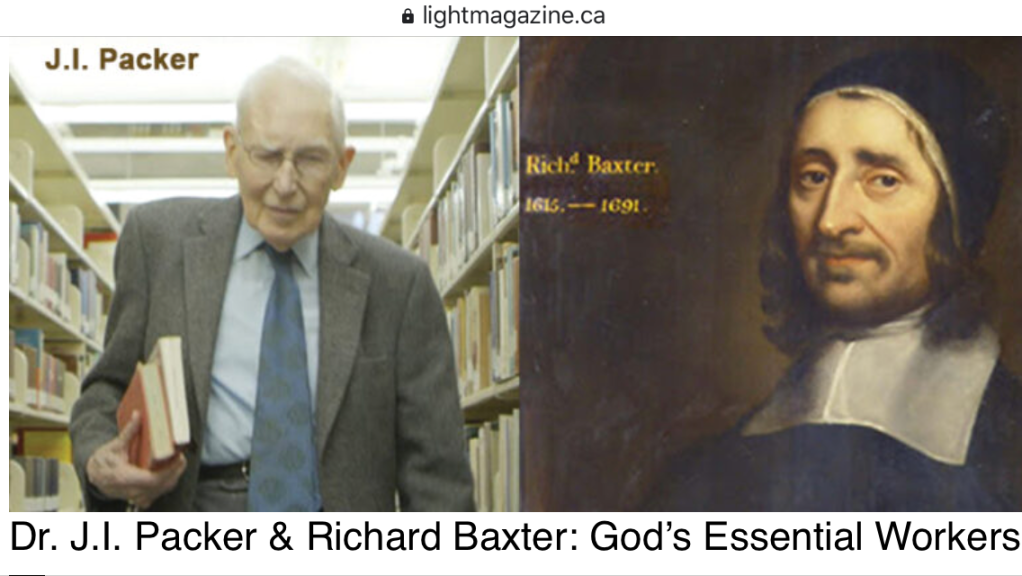
We commend to you our Light Magazine article written by myself and my daughter-in-law Ruthie Esther Hird. Few people realize that before the tragic Davin Report, many indigenous children attended day schools and lived with their parents.


We commend to you our Light Magazine article written by myself and my daughter-in-law Ruthie Esther Hird. Few people realize that before the tragic Davin Report, many indigenous children attended day schools and lived with their parents.
by edhird 2 Comments

Click to read the Light Magazine article about two of God’s essential workers.
We hear a lot about essential workers and essential services in these COVID-19 times. At 7 pm each night, many of us have been cheering for them, as we bang on our pots and pans. The late Dr. JI Packer, God’s essential worker, helps us rediscover Richard Baxter’s essential writings, not just for mortal life but more importantly for eternal life. What might it be like to cheer for God’s essential workers, including our theologians, pastors, evangelists, and missionaries?[1] Both Baxter and Packer knew from personal experience that physical death is not the worst thing that can happen to us. Both faced sickness and possible death early in life, but fixed their gaze on Jesus Christ in those difficult times. Packer, who did his Oxford doctorate on Baxter, helped us rediscover Baxter’s brilliant emphasis, derived from Rupertus Meledenius: “In Essentials, unity; in non-essentials, diversity; and in all things charity.”
Many believe that J.I. Packer, born in 1926 and passed on July 17th 2020, will be remembered as the principal theologian of the 21st Century. Packer and Baxter each had the same puritan passion for knowing truth, seeing it as our first duty.[2] Both represent the best of Puritanism without being ‘puritanical’.[3] Baxter in the 17th century commented: “I never discover a Truth in my studies, but it is as sweet to my mind as a feast to my body…I spend my time, and strength and spirits in almost nothing but studying after Truth.”[4] Many people nowadays dismiss theology as non-essential ivory-tower speculation. We live in an anti-rationalist culture that worships one’s feelings and denies any objective truth. Both men believed that the mind actually mattered, that reason and thinking were gifts from God that helped us discern truth. Their love for truth gave them a respect for the arts, sciences, history[5], as well as theology.[6] In Baxter’s day, theology was seen as the Queen of the sciences.[7]
For both men, knowing God with our head and heart was essential.[8] It is not enough to just know about God academically. Baxter held that “he is the best scholar who hath the readiest passage from the ear to the brain, but he is the best Christian who hath the readiest passage from the brain to the heart.” Dr J.I. Packer also warned against “hardness of heart and cynicism of the head.” Being heavenly-minded for Baxter and Packer was the key to making the most lasting impact on planet Earth.
Recognized by Time Magazine as one of the twenty-five most influential evangelicals, Dr Packer is best known remembered for his most popular book Knowing God. In reading Dr Packer’s doctoral thesis, I discovered that Packer’s Knowing God classic is an unpacking of the wisdom of Richard Baxter.
Jesus prayed in John 17:21 that we would be one as the Father and Son are one that the world may believe. While Baxter and Packer were both ordained Anglican clergy, they had a deep love for the wider body of Christ. That is part of the reason that Packer has served since 1979 at Regent College, a interdenominational college. Baxter called himself ‘a mere Christian’, expressing the truth that God’s people go beyond the bounds of any one denomination.[9] Both showed us that unity in the Essentials of the Gospel is essential to reach the world for Christ, such as the creed, the Lord’s Prayer, and the Ten Commandments. Are we willing to repent over our division and arguments over non-essentials? We can all agree to the full deity and humanity of Jesus, his virgin birth, his death for our sins, his physically rising from the grave. By contrast, the precise way that we baptize, celebrate communion, organize our church leadership, or sing worship songs are not essentials worth splitting over. Both men knew that not every Christian congregation has to be exactly the same, as sameness crushes creativity and spiritual intimacy.
After the heart-rending English civil war of 1647, Baxter felt called to be a peacemaker. [10] All his writings sought to promote “in all things, charity (love).” As Packer put it, Baxter “meddled much with Controversies…to end them.” It was Baxter’s respect for truth that kept him from ‘undignified wrangling’.[11] Even though he was often banned from preaching and forced out of town, Baxter stayed gracious and Christ-centered. Both Packer and Baxter were deeply charitable and humble in times of great controversy.[12] While neither liked controversy, both had the courage to take a stand for gospel truth when waves of conflict occurred. Even when recently needing to say no to false teachers, Packer spoke the truth in love. He never became vindictive and negative. At age 93, he is finishing well, staying focused on the goodness of the gospel essentials.
Our prayer is that in this COVID-19 pandemic, that we like these brave Christian men, Baxter and Packer, might rediscover what is essential, how to celebrate diversity, and the urgency of charitable love in all circumstances.
Rev. Dr. Ed and Janice Hird
Co-author, Blue Sky novel
-published in the June 2020 Light Magazine
-Readers are invited to read the first two Academia.edu articles of the JI Packer & Richard Baxter Trilogy:
1) Analyzing the Global Impact of Dr. J.I. Packer
2) An Evaluation of Richard & Margaret Baxter’s Lasting Contribution in 17th Century England
[1] The Gospel and church are deemed in our COVID culture as a nonessential service, unlike pot stores.
Peace Arch News April 23rd 2020, Tom Zillich, A33 “…now would be the worst time to curtail people’s access to those substances which have helped them deal with their anxiety.”
[2] JI Packer, The Restoration and Redemption of Man in the Thought of Richard Baxter, Oxford Doctoral Thesis 1954 (Regent College Publishing, Vancouver, 2002), 96, Packer commented regarding Baxter, “To the end of his life, he could never understand how his fellow Christians could love truth do little and seek it so half-heartedly.”
[3] Packer, Thesis, 95 (Baxter)…was anima naturaliter Puritana, the incarnation of Puritanism at its purest.”; Thesis, 98 Packer “…a Puritan thoroughbred…Baxter was the most consistent Puritan of them all.”
[4] Packer, Thesis, 95.
[5] Thesis, 68 Baxter “History is a very profitable study, if it be used for the right ends, and be rightly chosen. It is a very great help to understand the Scriptures, and to know the former and present state of the church; and to see the wonderful works of Providence, that otherwise would be lost to us.” XI:213
[6] Thesis, 95 (Baxter) “…to take all arts and sciences for his province so that he might himself construct the hierarchy of truth and show, according to the Puritan blueprint, how all this comes from God and leads to God.”
[7] Thesis,64 Packer: “Fundamental to all Puritan thought was the seventeenth-century version of the Medieval doctrine that all knowledge is a unity and all sciences, physical and moral, form a hierarchy at the head of which stands theology.”
[8] Packer, Thesis, 86, ‘Baxter never tired of reminding his readers that “Heaven-work and Heart-work are the chiefest parts of Christian duty”; “true religion…consists in heaven-work and heart-work, in the love of God and man…” Cure of Christian Divisions (1670) 209, 408, et al.
[9] The title of CS Lewis’ best-selling book Mere Christianity is taken directly from Richard Baxter.
[10] Thesis, 96.
[11] Thesis, 97 Packer: “He was exact in definition and accurate in usage; and his respect for truth and sense of responsibility for it kept him from undignified wrangling.”
[12] “What a gracious man”, I (Ed) thought as Dr J.I. Packer spoke. In the midst of a raging North Carolina snowstorm, he was giving a morning devotion at the Anglican Mission Winter Conference on John 21, in which he identified with Simon Peter’s growing through failure. The first time we ever spent time with Dr Packer was in 1979 in a student residence on the University of BC campus where we literally chased noises in the heating system. Dr Packer came across so humbly and natural, despite his worldwide reputation.
 Sandy Brown and her family have just moved to Spokane, Washington where her husband, Scott, is pastoring a new church. With a fresh start, Sandy is determined to devote more time to her four children. But, within weeks of settling in their new life, the Brown family is plunged into turmoil.
Sandy Brown and her family have just moved to Spokane, Washington where her husband, Scott, is pastoring a new church. With a fresh start, Sandy is determined to devote more time to her four children. But, within weeks of settling in their new life, the Brown family is plunged into turmoil.



To purchase any of our six books in paperback or ebook on Amazon, just click on this link.

 A wedding is a celebration of a couple coming to the point where they are truly willing to become one flesh in body, mind and spirit. Marriage is far more than just a contract or a prenuptial agreement. Marriage is a covenant of faith and trust between a man and woman, a covenant grounded for Christians in their shared commitment to Jesus Christ as Lord. At the heart of the concept of covenant is unconditional commitment. The hyper-individualism of our consumer culture is the acid rain of covenant love. The busyness and stress of our culture tends to swallow our best intentions even in marriage.
A wedding is a celebration of a couple coming to the point where they are truly willing to become one flesh in body, mind and spirit. Marriage is far more than just a contract or a prenuptial agreement. Marriage is a covenant of faith and trust between a man and woman, a covenant grounded for Christians in their shared commitment to Jesus Christ as Lord. At the heart of the concept of covenant is unconditional commitment. The hyper-individualism of our consumer culture is the acid rain of covenant love. The busyness and stress of our culture tends to swallow our best intentions even in marriage. Sandy Brown and her family have just moved to Spokane, Washington where her husband, Scott, is pastoring a new church. With a fresh start, Sandy is determined to devote more time to her four children. But, within weeks of settling in their new life, the Brown family is plunged into turmoil.
Sandy Brown and her family have just moved to Spokane, Washington where her husband, Scott, is pastoring a new church. With a fresh start, Sandy is determined to devote more time to her four children. But, within weeks of settling in their new life, the Brown family is plunged into turmoil.




 the Life’. He claimed to embody the essence of truth and meaning in his very person. To Pontius Pilate, he provocatively said: ‘Everyone on the side of truth listens to me’. Many people want to patronize Jesus and say nice things about him. But how many of us really want to listen deeply to him and let his words impact the core of our personalities?
the Life’. He claimed to embody the essence of truth and meaning in his very person. To Pontius Pilate, he provocatively said: ‘Everyone on the side of truth listens to me’. Many people want to patronize Jesus and say nice things about him. But how many of us really want to listen deeply to him and let his words impact the core of our personalities?
 Sandy Brown and her family have just moved to Spokane, Washington where her husband, Scott, is pastoring a new church. With a fresh start, Sandy is determined to devote more time to her four children. But, within weeks of settling in their new life, the Brown family is plunged into turmoil.
Sandy Brown and her family have just moved to Spokane, Washington where her husband, Scott, is pastoring a new church. With a fresh start, Sandy is determined to devote more time to her four children. But, within weeks of settling in their new life, the Brown family is plunged into turmoil.



Seek wisdom leading to life and peace.
a supportive and encouraging community that helps equip and develop one another to write for God's glory
life is a gift